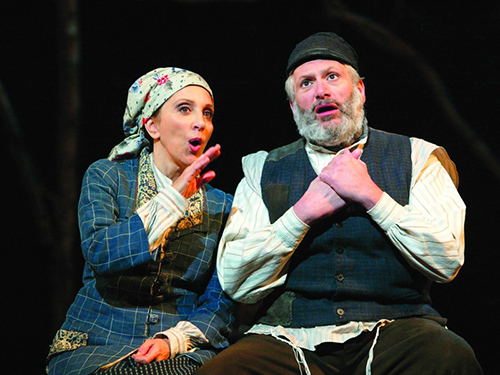

Rockleigh—“These are not just songs, they are documents of Jewish life,” said
Zalmen Mlotek, the artistic director of the nearly 100-year-old National Yiddish Theatre-Folksbiene to JLBC. As the longest continuously producing Yiddish theater company in the world, and one of the oldest theater companies in the United States, the Folksbiene has had an impact on audiences for decades. Zalmen, a Teaneck resident, is living the legacy he inherited from his parents and all those artists, writers, singers, songwriters, composers, playwrights, philosophers, revolutionaries and rabbis who expressed themselves in Yiddish for a thousand years before the Holocaust.
A natural teacher, as well as a gifted Julliard-trained musician, Zalmen schooled me about the Folksbiene’s rich history. “Created in 1915, the Folksbiene filled a void—which was fulfilling the need and popular desires the Jewish immigrants to see their lives depicted. Remember, this was the age before mass media. Immigrants from the turn of the century came to Yiddish theater to see their lives from Eastern Europe unfold onstage and to see what it was like to assimilate into America. They saw it depicted in drama, in pathos, with humor, in vaudeville and satire. This was their form of entertainment why Yiddish theater was the most popular entertainment of the time.”
While an alarming escalation of Jewish assimilation began sweeping through American Jewry during the late 60s and 70s, it was paralleled only by the steady decline of the conversational use of the Yiddish language “Yiddish as a language has lost the need to be the lingual franca of Jews. People assimilated, that generation wanted to speak English. The parents spoke Yiddish to each other when they didn’t want the kids to understand what they were saying.” And in Israel, Yiddish was being stilled as well.
The challenge of this century is how build up the theatre company so that it can survive for the next 100 years in a media driven world that barely speaks a rambunctious and rich language that has had its fair share of eulogies. It is a responsibility he takes seriously. “I have been entrusted with the mission of creating a relevant 21st century role for the theatre by introducing Yiddish compositions to a new generation with very different needs than audiences from 1915 through 1945.”
His roadmap for the future? “We have a touring company; we create new scores, present tri-lingual performances (Yiddish, English, Russian); programs like “Kids and Yiddish,” a form of Sesame Street meets Saturday Night Live. On Wednesday night, in Manhattan, we presented “The Golden Bride” an operetta that hasn’t been heard since the 1920’s. That’s what it’s all about—bringing people a visceral experience of Yiddish music, drama and comedy—via Yiddish theater. That’s what it means and anyone can get something out of it whether you are Jewish or not. Yiddish music is a reflection of Jewish history from early days of chanting in shul to folk songs mothers would sing to their children, songs created around the work place, around the labor movement to love songs. These songs are a picture of life long before the Holocaust.”
Comfortable performing for a crowd of hundreds in an elegant theatre or in an intimate gathering of 40+ engaged octogenarians at Rockleigh Jewish Home, Mlotek and his children are passionate about bringing Yiddishkeit to the world and the vehicle is the music. Last Sunday, he and all three of his children performed for the residents.
His son, Avrum, told JLBC. “The first time my father brought me to nursing homes to sing with him, I was 3 years old. I’ve been doing it since then, and as our family has grown, my brother and sister joined us. Now, I’m a chaplain at hospice and have the chance to provide the power of music to the patients, which is very profound. Singing Yiddish songs and niggunim stirs something in the listeners— and it’s emotionally and spiritually rewarding for us as well.” Avram is a student at Yeshivat Chovevei and the oldest of Zalmen’s three children. He adds, “I thank my father for showing me the strength of song.”
It’s exciting to see what the Folksbiene is bringing to its 100th year, which will celebrated next June in Greenwich Village with a week-long Yiddish Cultural Festival honoring his late parents, pioneers in saving Yiddish songs. The year begins with a celebration of the 50th anniversary of Fiddler on The Roof, with Topol, Theodore Bikel and Fyvush Finkel, as well as Pulitzer Prize/Tony Award-winning Sheldon Harnick—who will be celebrating his 90th birthday. The annual gala is June 9, 2014 – 7:30PM at The Town Hall. For tickets call (212) 213-2120 x203. Check out http://www.nationalyiddishtheatre.org
By Elyse Hansford













